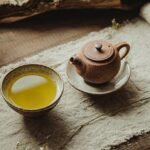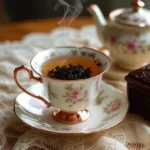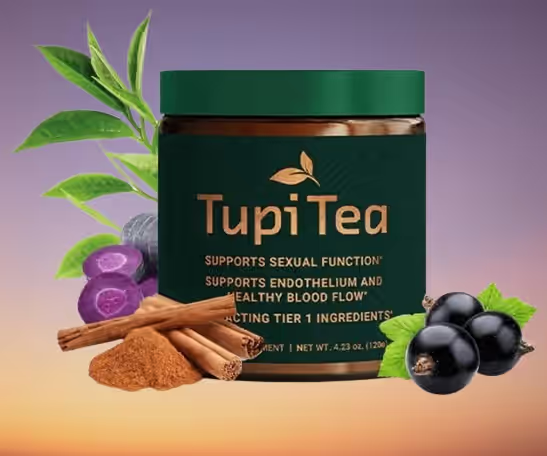Table of Contents
Ginseng tea has been gaining popularity as a potential aid for weight loss, so many people now ask, “does ginseng tea help lose weight?” This herbal drink, made from the roots of the ginseng plant, is known for its various health benefits. In this article, we’ll explore what ginseng is, how it might aid in weight loss, and other health benefits it offers.
Key Takeaways
- Ginseng tea may help with weight loss due to its appetite-suppressing properties.
- Research suggests that ginseng can alter gut microbiota, which may aid weight loss.
- Ginseng tea is also known for boosting energy levels and improving mental clarity.
- While generally safe, it’s important to consult a doctor if you have health concerns or are on medication.
- Incorporating ginseng tea into a balanced diet can enhance overall health and support weight loss efforts.
Understanding Ginseng Tea

What Is Ginseng?
Ginseng refers to both American and Korean ginseng. It’s a slow-growing perennial plant from the Panax genus. The roots are what’s typically used to make ginseng tea. It’s been thought to help with focus and reasoning skills. Other herbs are sometimes called ginseng, but they don’t contain ginsenosides, which are the active ingredient.
Types of Ginseng Used for Tea
There are a few main types of ginseng, and they’re not all the same. Asian ginseng (Panax ginseng) and American ginseng (Panax quinquefolius) are the most common. In traditional Chinese medicine, American ginseng is considered less stimulating than the Asian variety. The type of ginseng can affect how ginseng affects metabolism.
Nutritional Profile of Ginseng Tea
Ginseng tea is low in calories. It contains ginsenosides, which are thought to be responsible for many of its health benefits. The exact nutritional content can vary depending on the preparation method and the specific type of ginseng used. It’s worth noting that how ginseng tea aids metabolism is still being researched. Here are some of the potential benefits:
- May help with stress
- May help with weight loss
- May improve blood pressure
Ginseng Tea and Weight Loss

Mechanisms Behind Weight Loss
Ginseng tea is often discussed in the context of natural remedies for weight loss, and for good reason. It’s believed that ginseng can influence weight management through several pathways. One key area is its potential impact on metabolism. Some studies suggest that ginseng may help to boost metabolism, which could lead to increased calorie burning throughout the day. Additionally, ginseng might play a role in regulating blood sugar levels, which can help to prevent cravings and overeating. It’s important to note that while these mechanisms are promising, more research is needed to fully understand the extent of ginseng’s effects on weight loss.
Research Studies on Ginseng and Weight Loss
While anecdotal evidence abounds, it’s important to look at what scientific studies have to say about the benefits of ginseng for weight loss. Some research suggests a positive correlation between ginseng consumption and weight management. For example, a study involving overweight Korean women showed that consistent intake of ginseng extract led to a reduction in body weight and BMI. However, it’s crucial to acknowledge that these studies often have limitations, such as small sample sizes or specific populations. Therefore, while the initial findings are encouraging, further rigorous research is necessary to confirm these benefits of ginseng for weight loss and to determine the optimal dosage and duration for weight loss purposes.
Ginseng’s Role in Appetite Suppression
One of the more interesting aspects of ginseng tea is its potential role in ginseng tea and appetite suppression. Many people struggle with controlling their appetite, making it a significant barrier to weight loss. Ginseng is thought to influence appetite by affecting certain hormones and neurotransmitters involved in hunger and satiety. By potentially reducing cravings and promoting a feeling of fullness, ginseng tea might help individuals consume fewer calories throughout the day. This ginseng and appetite suppression effect could be particularly beneficial for those who find themselves frequently snacking or overeating. However, it’s important to remember that ginseng tea is not a magic bullet, and it should be combined with a balanced diet and regular exercise for optimal results.
It’s important to note that while ginseng tea may offer some support for weight loss, it’s not a substitute for a healthy lifestyle. A balanced diet, regular physical activity, and sufficient sleep are all essential components of successful and sustainable weight management.
👉 Discover the Premium Ginseng Tea Experience You Deserve 👈
Health Benefits of Ginseng Tea
Ginseng tea isn’t just a tasty drink; it’s also packed with potential ginseng tea health benefits. Let’s explore what this beverage can do for you.
Boosting Energy Levels
Feeling tired? Ginseng tea might be your answer. It’s known to give you a natural energy boost without the jitters of coffee. It can help you power through your day, whether you’re tackling a tough project or just need a little pick-me-up.
Improving Mental Clarity
Need to focus? Ginseng tea could help sharpen your mind. It’s believed to enhance cognitive function, making it easier to concentrate and think clearly. Some people drink it before work or study sessions to improve their mental performance.
Supporting Immune Function
Ginseng tea is thought to give your immune system a boost.
Some studies suggest that ginseng may help your body fight off infections and stay healthy. While it’s not a cure-all, incorporating ginseng tea into your diet could be a simple way to support your overall well-being.
Here’s a quick look at how ginseng might help:
- May reduce the severity of colds.
- Could shorten the duration of illnesses.
- Might enhance the body’s natural defenses.
How to Prepare Ginseng Tea

Ingredients Needed
Okay, so you wanna make some ginseng tea? It’s not rocket science, thankfully. Here’s what you’ll need:
- Dried ginseng roots or ginseng tea bags (the roots give a stronger flavor, just FYI).
- Water (filtered is always a good call).
- Optional: Honey or lemon, if you’re into that sort of thing. Some people even add ginger!
Step-by-Step Preparation
Alright, let’s get brewing. Here’s how I usually do it:
- If you’re using ginseng roots, slice about 5-6 pieces. If you’re using a tea bag, skip this step.
- Bring about 5 cups of water to a near boil. Don’t let it go crazy boiling; it can ruin the ginseng.
- Place the ginseng slices or tea bag in your mug.
- Pour the hot water over the ginseng.
- Let it steep for about 5-10 minutes, depending on how strong you want it. I usually go for 7 minutes.
- Remove the ginseng slices or tea bag.
- Add honey or lemon to taste, if desired. I like a little honey, but it’s totally up to you.
Tips for Enhancing Flavor
So, you’ve got your basic ginseng tea, but maybe you want to jazz it up a bit? Here are some ideas:
- Try adding a slice of ginger while steeping. It gives it a nice kick.
- Mix it with green tea. Some people find the ginseng flavor a bit too earthy on its own, and the green tea balances it out.
- A tiny splash of lemon juice can brighten the flavor.
- Experiment with different types of honey. Clover honey is mild, while buckwheat honey is stronger. See what you like best!
I’ve found that the quality of the ginseng really makes a difference. Cheaper ginseng can taste kind of bland, so it’s worth it to spend a little extra for the good stuff. Also, don’t over-steep it, or it can get bitter. Trust me, I’ve been there.
👉 Try the Best Ginseng Tea for Ultimate Wellness Today 👈
Potential Side Effects of Ginseng Tea

Common Side Effects
Okay, so ginseng tea is generally considered safe for most people, but like anything, it can have some side effects. It’s not all sunshine and rainbows, you know? Some people might experience nervousness, insomnia, or even headaches. I know, not exactly what you want when you’re trying to relax with a cup of tea. Upset stomach and dizziness are also on the list. And, just to make things even more interesting, some folks might get skin reactions or allergic reactions. Women might notice changes in their menstrual cycle. So, yeah, it’s not a free pass for everyone.
Precautions to Consider
Before you jump on the ginseng tea bandwagon, there are a few things to keep in mind. If you’ve got any existing medical conditions, definitely talk to your doctor before you start drinking it. It’s always better to be safe than sorry, right? Also, there’s not a ton of research on whether ginseng is safe during pregnancy or breastfeeding, so it’s probably best to avoid it during those times. Some experts suggest not using it for more than three months at a time. Listen to your body, and don’t overdo it.
Interactions with Medications
Ginseng can play funny games with certain medications. It’s not always a team player. For example, it can interact with blood thinners like warfarin, diabetes medications including insulin, and diuretics. It can also mess with digoxin and morphine. So, if you’re taking any medications, it’s super important to chat with your doctor or pharmacist to make sure there aren’t any potential interactions. You don’t want your tea messing with your meds, trust me.
It’s important to remember that everyone reacts differently to ginseng. What works wonders for one person might cause problems for another. Pay attention to how your body responds, and adjust your intake accordingly.
Incorporating Ginseng Tea into Your Diet
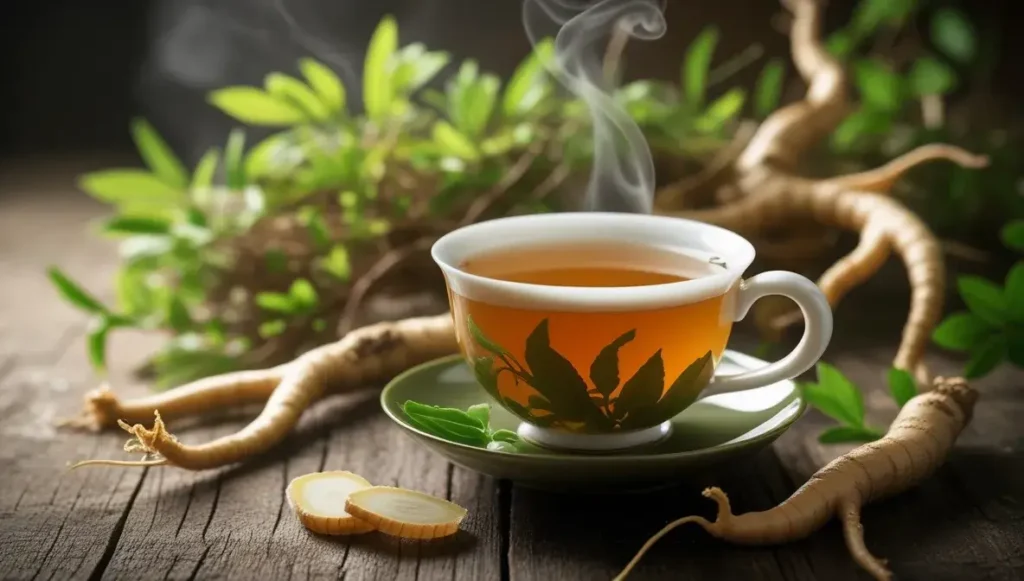
Best Times to Drink Ginseng Tea
So, you’re thinking about adding ginseng tea to your daily routine? Great! Timing can actually make a difference in how you experience its effects. Many people find that drinking it in the morning or early afternoon is ideal, as it can provide a gentle energy boost without disrupting sleep. However, it’s not a one-size-fits-all thing. Some folks enjoy it as a mid-afternoon pick-me-up, while others prefer it before a workout. Experiment a little and see what works best for your body’s natural rhythms. Just be mindful of its potential stimulating effects, especially if you’re sensitive to caffeine or other stimulants.
Combining Ginseng with Other Teas
Ginseng tea has a unique, earthy flavor that some find a bit strong on its own. The good news is, it plays well with others! Pairing it with other teas can create some interesting flavor profiles and potentially amplify the health benefits. Here are a few ideas:
- Green Tea: A classic combo! The grassy notes of green tea complement ginseng’s earthiness, and you get a double dose of antioxidants.
- Ginger Tea: If you’re feeling a bit under the weather, ginger’s warming properties combined with ginseng’s immune-boosting potential can be a great choice.
- Honeybush or Rooibos: These naturally sweet teas can mellow out ginseng’s slightly bitter edge, creating a smoother, more palatable blend.
It’s worth noting that combining ginseng with other herbal remedies or supplements could potentially lead to interactions. If you’re taking any medications or have underlying health conditions, it’s always a good idea to chat with your doctor or a qualified healthcare professional before mixing things up.
Creating a Balanced Diet
Ginseng tea can be a fantastic addition to a healthy lifestyle, but it’s not a magic bullet for weight loss or overall well-being. The most important thing is to focus on creating a balanced diet that nourishes your body with a variety of whole foods. Think plenty of fruits, vegetables, lean proteins, and whole grains. Here’s a simple breakdown:
- Prioritize whole, unprocessed foods: These provide essential nutrients and fiber.
- Stay hydrated: Water is key for overall health and can help with appetite control.
- Be mindful of portion sizes: Even healthy foods can contribute to weight gain if you overeat them.
- Don’t skip meals: Regular meals help regulate blood sugar levels and prevent overeating later on.
Remember, ginseng tea is just one piece of the puzzle. It can support your efforts, but it works best when combined with a healthy diet and regular physical activity.
👉 Grab Your Top‑Rated Ginseng Tea Blend Before It’s Gone 👈
Expert Opinions on Ginseng Tea
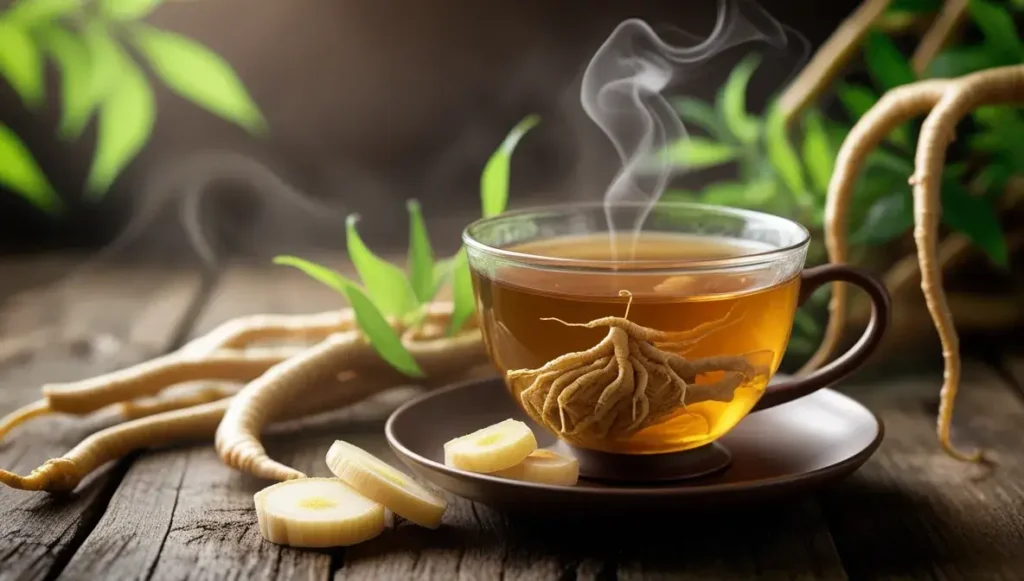
Nutritionist Insights
Nutritionists often highlight ginseng tea’s potential benefits, but also emphasize the importance of moderation and individual responses. Some nutritionists point out that while ginseng may offer a slight boost to metabolism or energy levels, it’s not a magic bullet for weight loss. A balanced diet and regular exercise are still the cornerstones of any successful weight management plan.
- Ginseng can be a helpful addition to a healthy lifestyle.
- It’s not a substitute for proper nutrition and exercise.
- Individual results can vary significantly.
Nutritionists generally agree that more research is needed to fully understand the long-term effects of ginseng consumption. They also caution against relying solely on ginseng tea for weight loss, as sustainable results require a holistic approach.
Scientific Community Views
The scientific community is actively researching the effects of ginseng, including its potential role in weight management. Studies have explored ginseng’s impact on metabolism, appetite, and energy expenditure. However, the results are often mixed, and more rigorous, large-scale trials are needed to draw definitive conclusions. It’s important to note that different types of ginseng (e.g., American vs. Korean) may have varying effects.
Personal Testimonials
Personal experiences with ginseng tea vary widely. Some individuals report feeling more energized and less hungry, which they believe contributes to their weight loss efforts. Others may not notice any significant effects. It’s important to remember that anecdotal evidence is not a substitute for scientific research, and individual responses can be influenced by a variety of factors, including genetics, diet, and lifestyle. Some people find that ginseng tea helps them feel more alert and focused, which indirectly supports their weight loss goals by making it easier to stick to their exercise routines and healthy eating habits.
Final Thoughts: Does Ginseng Tea Help Lose Weight?
So, does ginseng tea really help with weight loss? The short answer is, it might. Some studies suggest that ginseng can help suppress your appetite and even limit how much fat your body absorbs. But remember, it’s not a magic solution. Drinking ginseng tea alone won’t melt away the pounds. It should be part of a bigger picture that includes a balanced diet and regular exercise. If you enjoy the taste and find it gives you a little boost, it could be a nice addition to your routine. Just keep your expectations realistic, and don’t forget to consult with a healthcare professional if you have any concerns.
👉 Order the Best‑Selling Ginseng Tea for Powerful Results 👈
Frequently Asked Questions
What is ginseng tea?
Ginseng tea is made from the roots of the ginseng plant. It’s known for its earthy taste and is often used for its health benefits.
Can ginseng tea help with weight loss?
Yes, ginseng tea may help with weight loss by reducing appetite and preventing the body from absorbing too much fat.
How do you prepare ginseng tea?
To make ginseng tea, you need dried ginseng roots, honey, and water. Simply steep the roots in hot water for about 10-15 minutes.
What are the health benefits of ginseng tea?
Ginseng tea can boost energy, improve focus, and support the immune system, among other benefits.
Are there any side effects of ginseng tea?
Some people might experience side effects like insomnia or digestive issues. It’s best to consult a doctor if you have concerns.
When is the best time to drink ginseng tea?
You can enjoy ginseng tea any time of day, but it may be best to drink it in the morning for an energy boost.





